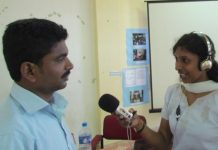
When reporting from a conflict zone a journalist needs to be sensitive, understand history and cultural issues, and put people first
Reporting about conflict and working in a conflict zone is complex. Often the facts are not revealed in a way that offers the level of understanding the situation demands.
The journalist needs to be sensitive, have an understanding of history, be aware of cultural issues, and put people before the story.
1: Avoid clichés
“The Heart of Darkness” is the title of a book by Joseph Conrad written in the early part of the 20th Century about a trip up the River Congo. It does not need to feature in every story about the Congo and especially not in the headline.
2: Question everything
International NGOs by definition are on the side of the victim, the underdog. They are keen to generate interest in their perspective. They have a story to tell. Often that story is shocking in its own right without the extra tug of emotion, the extra twist given by the NGOs. This especially important when dealing in second-hand accounts of what eye-witnesses said.
3: Apply caution
The truth is out there, but it’s incredibly hard to find it. Take the Democratic Republic of Congo, for example. It is a huge country – bigger than Britain, France, Germany, Spain, Italy and Poland combined. As a journalist, unless you’ve experienced the situation first hand, you’ll have to rely on what someone else tells you. Do so with caution.
4: Add context
What you witness may be terrible locally, but be sure to offer national, regional, global and historical context to your reporting so that those you are informing have the widest perspective of the significance.
5: Check facts
Facts are loaded. A review of the cuttings file on Congo will show you that 5.4 million people have died in the conflict in the Democratic Republic of Congo. Do you know how this figure was arrived at? Do you know what period the statistic covers? If you don’t, then don’t use it.
6: Stay human
Sexual violence and rape are terrible crimes. When reporting, don’t forget that all the headlines and stories written have a human face.
7: Use the right words
Use language with care. Genocide is a specific legal term with a particular meaning. It does not automatically follow that, because a large number of people have been killed, it’s genocide.
8: Don’t be led
It’s all about timing. Remember that pressure groups will often release information to coincide with significant events in the political calendar. For example, UN Security Council debates are often previewed by NGO’s making demands calling for action. As a journalist, you set the agenda – don’t have it set for you.
9: Recognise local pressures
Congolese journalists work in a completely different political environment than the one you are lucky to work in. They face censorship (or self-censorship), harassment, intimidation and murder threats. They are often not able to report what they would like to.
10: Be aware of history
History repeats itself. Journalism doesn’t have to. Journalism should not be an accumulation of clichés ending with the latest addition to the mix. Think originally, think laterally. Find stories which tell the untold facts and which get beyond the clichés.

Expanding on the core principles:
-
- Sensitivity, history, culture, and people:
- Beyond mere “sensitivity,” journalists must cultivate empathy. This means actively listening, acknowledging trauma, and respecting the dignity of those they interview.
- “Understanding history” isn’t just knowing dates. It’s grasping the long-term consequences of colonialism, resource exploitation, and power dynamics. It’s recognising how historical grievances fuel current conflicts.
- “Cultural issues” encompass more than just customs. It involves understanding local belief systems, social hierarchies, and the impact of conflict on cultural identity.
- “Putting people first” means prioritising their safety and well-being, even if it means delaying or forgoing a story. It requires a commitment to do no harm.
- Sensitivity, history, culture, and people:
Adding depth and perspective to the 10 points:
- Beyond clichés: embracing nuance:
- Clichés simplify complex realities. Instead of “Heart of Darkness,” journalists should seek original metaphors and narratives that reflect the specific context.
- Challenge the “victim” narrative. Explore agency, resilience, and the diverse experiences of people affected by conflict.
- Avoid the single narrative, acknowledge the multiple truths that exist.
- Critical inquiry: Deconstructing narratives:
- NGOs play a vital role, but their perspectives are shaped by their mandates and funding. Triangulate information from multiple sources, including local communities, government officials, and independent analysts.
- “Second-hand accounts” are inherently subjective. Verify information meticulously, consider the motivations of sources, and acknowledge the limitations of eyewitness testimony.
- Journalists from certain cultures need to be aware of the “white saviour” complex.
- Caution and verification: Navigating uncertainty:
- Recognise the limitations of your own perspective. Acknowledge what you don’t know, and avoid making sweeping generalisations.
- Develop local networks of trusted sources. Invest time in building relationships with people on the ground.
- Understand that in many conflict zones, information is weaponised.
- Contextualisation: The power of framing:
- Connect local events to broader geopolitical trends. Explain how global powers and economic interests contribute to conflict.
- Consider the historical trajectory of the conflict. How did it evolve? What are the root causes?
- Consider the climate crisis, and how that is adding to instability.
- Fact-checking: The responsibility of accuracy:
- Question the methodology behind statistics. Understand the biases and limitations of data collection.
- Be wary of inflated figures used to generate attention or funding.
- Understand that in conflict, data is often incomplete, or biased.
- Humanising stories: Beyond the headlines:
- Focus on the individual experiences of people affected by conflict. Tell their stories with dignity and respect.
- Avoid sensationalism and exploitation. Humanize the victims, not just objectify their suffering.
- Give people a voice, and a chance to tell their own story.
- Language and terminology: The power of words:
- Use language that is precise and accurate. Avoid inflammatory or dehumanizing terms.
- Avoid adjectives and adverbs.
- Understand the legal and cultural implications of terms like “genocide,” “ethnic cleansing,” and “war crimes.”
- Be aware of the power of language to shape perceptions and perpetuate stereotypes.
- Independent reporting: Resisting manipulation:
- Be aware of information warfare and propaganda. Develop critical thinking skills to identify and counter manipulation.
- Maintain editorial independence. Resist pressure from governments, NGOs, and other interest groups.
- Recognise that all sides of a conflict are trying to control the narrative.
- Understanding local pressures: Solidarity and support:
- Recognise the risks faced by local journalists. Support their work and advocate for their safety.
- Acknowledge the power imbalances between international and local media.
- Collaborate with local journalists, and amplify their voices.
- Historical awareness: Breaking the cycle:
- Challenge the narrative of inevitability. Conflict is not inevitable. It is the result of human choices.
- Explore alternative solutions and pathways to peace.
- Look for the stories of peace, and reconciliation, that are also present in conflict zones.
By incorporating these additional layers of depth and perspective, journalists can contribute to a more nuanced and informed understanding of conflict, fostering empathy and promoting peace.








